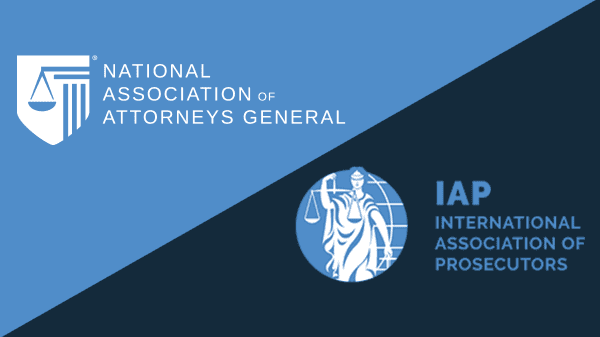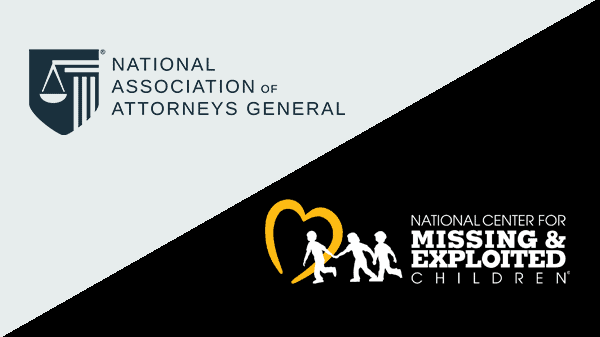2017 International Fellows
Charlotte Brook, Crown Counsel and Team Manager, Criminal Team, Crown Law Office, New Zealand; Charlene Tay Chia, Director and Deputy Senior State Counsel, Criminal Justice Department, Singapore; Ayana Duncan, Assistant State Attorney, Felony Domestic Crimes Unit, Miami-Dade Office of the State Attorney, Florida; Ihtesham Qadir, Prosecutor General, Punjab, Pakistan; Creighton Waters, Assistant Deputy Attorney General, Office of the Attorney General, South Carolina; Anne Yang, Prosecutor, Qiaotou District Prosecutor’s Office, Taiwan
This group was asked to consider and discuss how prosecutors and investigators can use nontraditional methods and work together more closely and effectively, despite their distinctive roles, in an ever-changing and sophisticated criminal atmosphere through use of the internet, dark web, and modern technological schemes surrounding the illegal trade of persons and goods and effective methodologies to address these issues.
It is a difficult task ascertaining the best ways prosecutors and investigators can address non-traditional criminal activity concerning illegal trade when typical remedies are ineffective. This assignment poses challenges primarily because crime patterns change very quickly, but this reality does not negate that prosecutors and investigators must still extend efforts to jointly tackle these problems. For the purpose of this paper, the group has defined non-traditional criminal activity as: crimes that are typically carried out via highly organized criminal enterprises, often involve a multinational character, and have been limited to human trafficking (most often for sex or labor); multinational drug trafficking; intellectual property theft; and counterfeiting.
Additionally, these criminal enterprises are more and more frequently taking advantage of the global economy and transit capabilities, as well as advances in technology that defy traditional investigative techniques. Because of the speed of the international economy, which is exploited in just as rapid a fashion by criminal enterprises, it is necessary for prosecutors to become involved in the process much earlier than in traditional cases. Hence, the roles of prosecutors and investigators must be especially well-defined to ensure that prosecutorial independence remains intact. Specialized training of prosecutors and investigators is also critically important to keep them abreast of new standards, industry practices, and evolving criminal patterns to help facilitate more successful investigations and hopefully, improved prosecutions. Efforts also have to be extended to train the pubic and policymakers.
Education of the public and policymakers
The first item that must be recognized is the scope of the problem at hand involving multinational criminal enterprises and their practices. These complex enterprises are extremely broad in scope, as they make use of a rapid global economy and an increasingly efficient and anonymous technology to generate new and different criminal profits. While many members of our group had experience with various aspects of problems involving criminal enterprises, none had experience with every aspect we identified as difficulties inherent with any criminal entity. We also believe that policymakers and legislatures are probably unaware of the scope criminal enterprises have and thus have not allocated sufficient resources to combat them. For example, in the United States, sex and labor trafficking used to be viewed as a problem for other countries. However, they both are now recognized as significant problems in the United States as well, thus resulting in increased efforts and resources to combat them.
Human trafficking also lends itself to other crimes. The illegal trade of persons, such as human trafficking involving sex and labor, actually goes hand in hand with intellectual property theft or counterfeiting of consumer goods. Citizens and policymakers likely view intellectual property theft or counterfeiting as a victimless crime or one that only has a minor effect on the bottom line of wealthy corporations, failing to realize that they create safety issues for the public. These safety issues go beyond the general corrupting influence and its association with labor, sex, and drug trafficking, and in fact create very serious public safety threats from a terrorism standpoint. As such, prosecutorial and investigative agencies need to band together to lobby and educate not only the general public but also policy makers and each other. These collaborative and coordinated activities should help to incentivize those in power to provide sufficient resources and legislative or legal developments to fully address the extent of this larger problem.
Education and specialization of prosecutors and investigators
Non-traditional criminal activity is rampant, but there appears to be a lack of understanding among prosecutors and investigators (particularly at the state and local levels) regarding the extent to which these activities occur and how to resolve them. While it appears that governments in various countries have developed a number of programs to begin addressing problems associated with non-traditional criminal activity—through, for example, human trafficking or intellectual property theft “czars,” international anti-money laundering efforts, resident legal advisors, mutual legal assistance treaty (MLAT) requests, and other exchange programs and the like—such efforts or even the knowledge of such efforts have not filtered down to the state, province, or local level, as much as necessary. However, this is where efforts must be extended because it is at the local, state, or provincial levels that most crime is detected and handled. The next mandatory step is to develop a think tank or other academic body that can define the extent of the problem and create and identify strategies and solutions for all aspects of a nation’s criminal justice system.
The paramount goal for this academic body ultimately should include educating prosecutors concerning the full range of issues involving non-traditional criminal activity in illegal trade practices, as well as identifying best practices for prosecutorial and investigative agencies in addressing these challenges. Subsequent to their recommendations and consultation with prosecutorial and investigative agents, a comprehensive manual, handbook, playbook, or unified strategy should be prepared. In particular, the guidebook should offer best practices and recommendations to tackle illegal activity from a topical standpoint including, for example:
- Best investigative practices and available international tools (and perhaps domestic if a particular model has proven effective) in illegal trade cases;
- Identification of necessary evidence in these cases and techniques for obtaining such evidence, which might be outside of the normal experience for investigators (such as MLAT requests);
- Identification of existing crimes that can be used to address these problems and the elements thereof;
- Identification of specific legal strategies that might be necessary or typical in these cases for evidentiary, authentication, or other issues, and documents with precedential value to assist prosecutors preparing for legal proceedings;
- Identification and development of necessary specialized forensic, scientific, or other expertise that is necessary to handle issues in these cases, whether, for example, to identify and help victims of human trafficking, recognize counterfeit goods and determine their value for value-based charging, and penetrate emerging technologies, such as digital currencies like Bitcoin or illicit trade on the dark web;
- Conversational tools enabling prosecutors and investigators to discuss past cases and experiences, whether they were a success or failure, and what can be learned from those experiences;
- Identification of particular pitfalls or “poison pills” that should be avoided;
- Emphasis on available forfeiture procedures that have a significant deterrent effect for illegal activity, such as removal of money and assets from the criminal enterprise;
- Development of consistent standards for prosecutions to minimize drastically different approaches and legal outcomes;
- Identification and development of desirable changes in legislation and other legal rules necessary to address difficulties with these cases; and
- Recognition and appreciation for the different roles prosecutors and investigators have.
The above-described effort would likely have to begin at an individual, national level and then expand to address the complexities of interfacing with similar agencies in different partner countries. The effort has to begin with identifying existing resources and expertise available to tackle criminal activity at the national level with various partner countries.
As this information is developed, the next step must include allocating resources to provide joint training and expertise to various prosecutorial and investigative agencies. Such training will not only increase the capacity of prosecutorial and investigative agencies to recognize and detect symptoms of non-traditional criminal activity in trade, but it also will help facilitate regular communication between prosecutorial and investigative agencies tasked with addressing the illegal practices.
Once regular communication becomes an institutional practice, collaboration among prosecutorial and investigative agencies may take many forms—at the local, state, and provincial levels—between an investigative agency and its accompanying prosecutorial agency. Moreover, increased communication can then expand to a larger regional, national, and international level among many partner agencies. Interaction could be as simple as the creation of regular meetings between partner officers and prosecutors, or it could include the allocation of resources for multidisciplinary task forces involving prosecutors, law enforcement, and experts. Continuing communication may be accomplished, although somewhat unorthodox in approach, with creating an “on call” prosecutor who responds to officers’ questions or other legal assistance in a rapidly developing situation.
Members of the group observed that co-location of prosecutors and investigators tasked with addressing similar issues has resulted in greater efficiency, as the participants not only develop close working relationships and quick reactions to each other’s needs, but exponentially develop cumulative expertise on a subject matter. Similarly, it was observed that creating professional connections on the multinational level accelerates cooperation and collaboration. Additional training is necessary, however, to ensure that prosecutors and investigators avoid concerns with sovereignty or criminal discovery that might arise from parallel investigations in more than one nation.
As it relates to task forces, the group recognizes the important function they serve. However, the group believes that although they can be very impactful, managing a task force on a national or international level would very difficult and complex. The group used as an example, for instance, the United States alone, in fighting a large and well-financed criminal enterprise involved in human or drug trafficking or intellectual property theft.¹ The same applies to other agencies and governments in other nations. Hence, although it would be a great idea to have an international task force that includes partner countries and agencies, this effort would be even more complicated. The group believes, however, that it is still essential to extend efforts at international collaboration because the benefits of such frequent interaction far outweigh the logistical difficulties. If policymakers and governments provide sufficient resources and support, an effective international task force could become a reality.
Development and execution of an investigative plan
The development of expertise, training of prosecutors and investigators, and institutionalized communication would inform how investigations and prosecutions are conducted with these complex criminal enterprises. Prosecutors should work with investigators on these cases but should also supervise the development of an investigative plan that sets forth the overall strategy of the operation with the goal of ensnaring as many high-level perpetrators as possible. Such a plan should focus on crimes to be charged and obtaining evidence to secure a conviction pursuant to legal statutes, but it should also include information on deriving at factual themes prosecutors think will be most persuasive in court. Practical matters must also be taken into account. For example, when the need arises to seek mutual legal assistance from a foreign country, this request should be made as early in the investigation as possible given the length of time the MLAT process usually takes. Ultimately, though, prosecutors and investigators must bear in mind that these operations are organic in nature and the goals and theories may change as the case progresses.
Avoiding conflict
Our group highly recommends that prosecutors and investigators maintain frequent contact and collaborate on matters to have the most impact in combatting illegal activity. Advocating for this level of contact and interaction raises various issues and problems for which prosecutor and investigator expectations must be managed so that respect for each other’s roles is maintained. Often, prosecutors and investigators disagree on many important aspects of a case from the evidence needed to the appropriate charges or resolutions. Of utmost importance, however, is the prosecutors’ ability to exercise prosecutorial discretion and remain independent from investigators. When working collaboratively, prosecutors must be cautious and avoid engaging in any conduct that could put them at risk of being called as a witness.
Prosecutors have a responsibility to ensure there is sufficient admissible evidence to establish guilt under the requisite standard. Investigators, however, may follow different practices, given their standard for investigating is different than the legal burden a prosecutor must meet in a court of law. Further, investigators and prosecutors may disagree as to whether sufficient evidence has been obtained to enable charges to be properly brought. It is critical, therefore, that when prosecutors work collaboratively with investigators, their respective roles are clearly defined to preserve the prosecutor’s independence as the decision maker in respect of the prosecution.
The need for flexibility
While it is important to ensure that investigators are free to investigate cases as the situation demands, a degree of uniformity and consistency are important. Prosecutors can provide investigators with best practice guidelines to follow. Investigators can rely upon this information as the foundation from which they work. These guidelines will be particularly helpful to investigators when they are working on a certain crime for the first time. These collaborative efforts also will ensure that basic requirements are met and that investigators take a holistic approach through gathering evidence and supporting victims (which in turn will slowly 9 increase reporting rates, making offending easier to detect and prosecute). We recognize as prosecutors that we are not immune to understanding the importance of being flexible. Just as prosecutors can offer helpful information to investigators enabling them to better carry out their duties, investigators can also assist prosecutors to understand the evidence in their cases and present the information before a tribunal or jury more effectively. They both can learn from one another, and both must remain flexible in their styles and approaches to resolving crime.
The need for partnerships
A major barrier to detecting and investigating these non-traditional crimes is the reluctance of many victims to report illegal activity to authorities, whether out of shame, fear of the perpetrators, mistrust of authorities, or concern about the impact on them (for example, they may have concerns about their immigration status or financial dependence on the offenders). Therefore, it is essential that investigators and prosecutors engage with all relevant partner agencies, enlisting all necessary government parties and agencies to investigate illegal activity while simultaneously supporting victims. Where possible, joint task forces should be created, which include the relevant enforcement authorities, immigration authorities, and agencies that provide financial assistance and accommodations to victims, just to name a few. In many instances, especially with international elements, translation services will be needed for victims.
The best example of a non-traditional crime that requires this type of an all-encompassing approach is human trafficking. Human trafficking is often a hidden crime because victims are usually isolated and disempowered. Prosecutors and investigators must pursue these cases because such action helps to identify other victims and to bring perpetrators to justice. These cases also require combined efforts through developed partnerships with non-governmental and 10 governmental entities. Prosecutors and investigators are integral to this process and must work jointly to educate the public, each other, and foster cooperation and partnerships between all relevant government and non-governmental organizations.
Conclusion
Most criminal activity, whether committed by individuals or by organized criminal groups, is conducted around the clock with use of new information technology-based scientific methods. Prosecutors and other law enforcement agencies must rethink strategies to eradicate the menace of illegal trafficking of humans and goods. Such organized criminal groups are potential threats to the future of young generations in nations around the world.
In addition to our other previously noted recommendations, we also offer the following:
- Educate the public and policymakers as a means to allocate additional resources;
- Educate prosecutors and investigators on best practices eventually enabling them to develop expertise on particular areas of law and criminal activity;
- Establish regular communication and collaboration of prosecutorial and investigative agencies tasked with addressing non-traditional criminal activity;
- Focus on developing a comprehensive investigative plan at the start of a case, aiding investigators to gather essential evidence that prosecutors will need while recognizing that investigations are organic (and strategies and direction may change as truths and information are uncovered); and
- Create practices and procedures that address potential pitfalls when prosecutors and investigators collaborate and identify the best ways to investigate and prosecute special, highly technical, and complex cases.
¹ In the United States alone, the group identified the myriad groups and agencies that would have to participate in a task force to tackle illegal activity in illegal trade to include at least, multiple federal, state, or local agencies as diverse as the U.S. federal agencies like the Department of State, Immigration and Customs Enforcement, many offices in the Department of Justice (including two like the Office of International Affairs and Office of Oversees Prosecutorial Development Assistance and Training), or State’s Bureau of International Narcotics and Law Enforcement Affairs, the Federal Bureau of Investigations, the Secret Service, the Coast Guard; the Drug Enforcement Administration; Treasury’s Financial Crimes Enforcement Network and Terrorism and Financial Intelligence, the Federal Trade Commission, Department of Homeland Security, the Internal Revenue Service, and federal, state, or local intellectual property or human trafficking offices and victim rights agencies; and, of course, state and local prosecutors and investigators.





